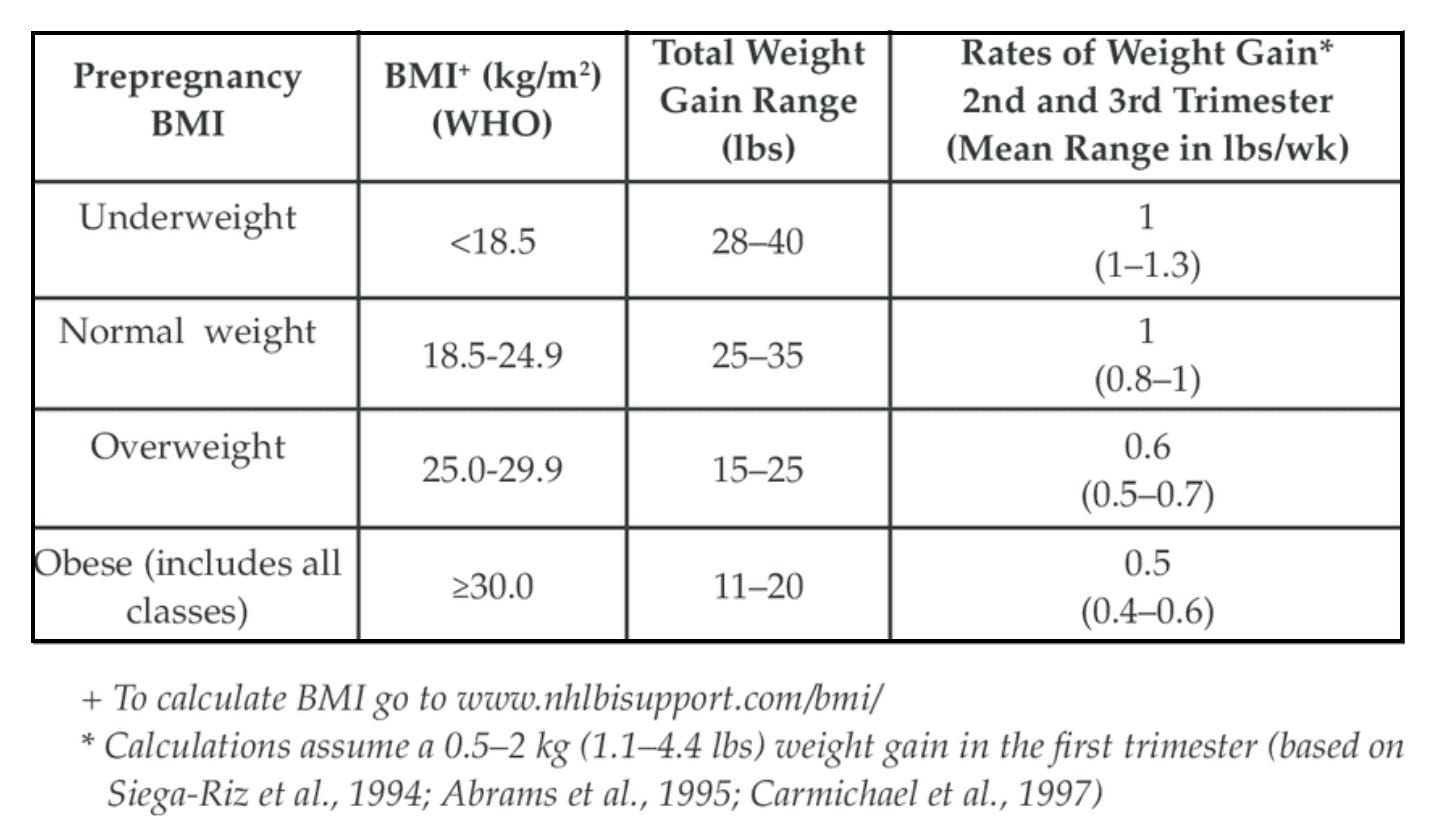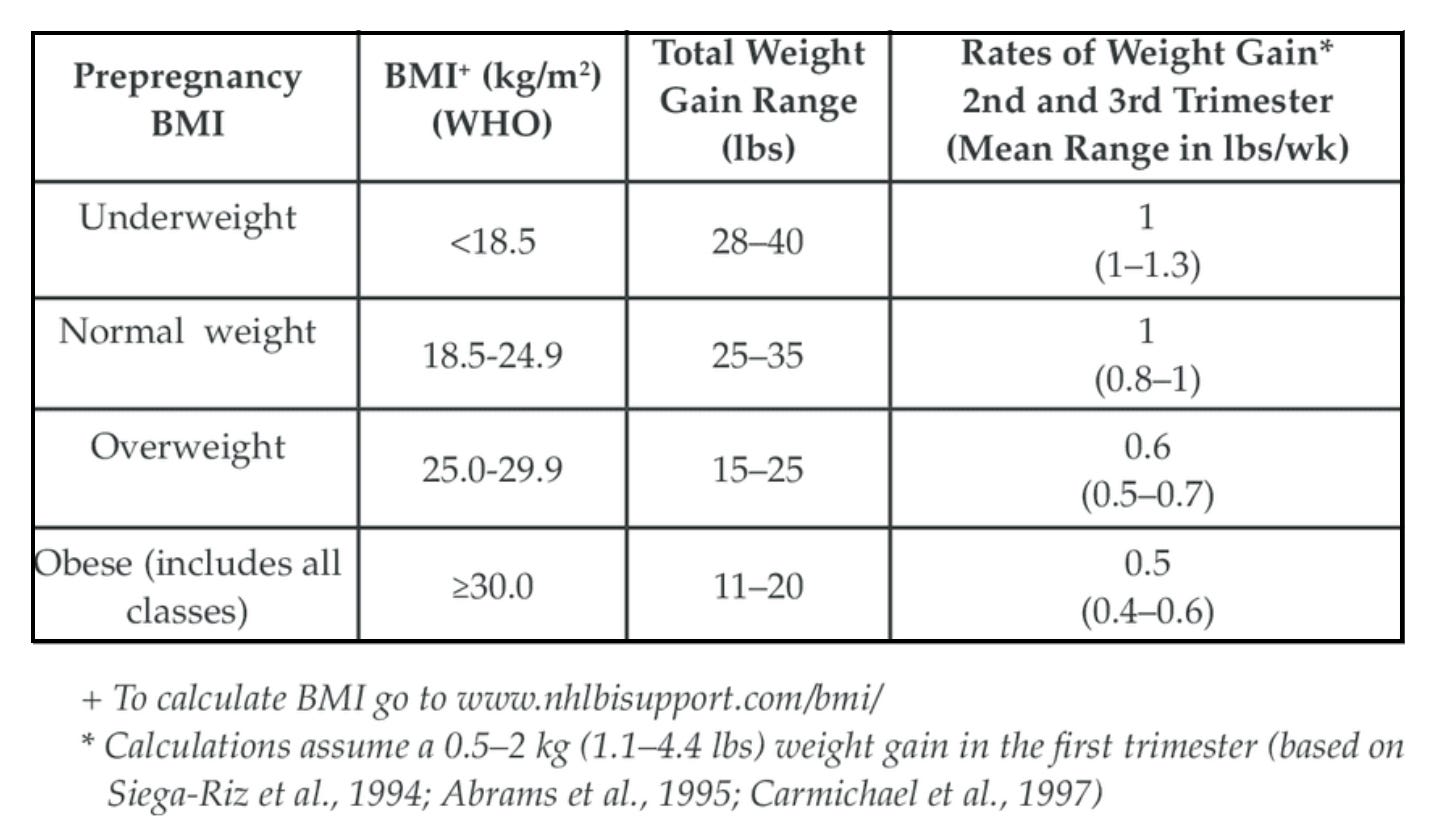Pregnancy is one of the only times in our lives that we are expected to gain weight.
Weight gain during pregnancy is normal, and often celebrated, because it represents the growth and development of new life. This can feel foreign to many of us who spend a significant amount of time during our adult lives watching our weight and being cautious about not gaining too much.
Healthy and optimal pregnancy weight gain depends on multiple factors, including your pre-pregnancy weight and body mass index (BMI). As a rule, underweight mothers should gain more weight during pregnancy than overweight and obese mothers. Pregnancy weight gain also differs if you are carrying more than one baby. Mothers of twins and triplets are expected to have higher pregnancy weight gain than mothers of singletons.
How often does my weight need to be checked when I am pregnant?
Your weight and BMI will be plotted during every prenatal visit. BMI, a measurement of weight for height, is used as a marker of body fatness and is an indicator of one’s risk of developing weight-related health problems. During pregnancy, BMI is also used to assess one’s risk of possible weight-related pregnancy complications arising.
What are the BMI categories?
It’s important for all women to know which BMI category they fall into at the beginning of pregnancy, as one’s recommended pregnancy weight gain depends on their pre-pregnancy body mass index.
BMI Categories (from CDC.gov website)
- Underweight = BMI less than 18.5
- Normal or healthy weight = BMI between 18.5 and 24.9
- Overweight = BMI between 25 to 29.9
- Obese = BMI greater than or equal to 30
Based on a National Vital Statistics Report from 2016, among women giving birth in the U.S. in 2014, 3.8% were underweight, 45.9% were of normal weight, 25.6% were overweight, and 24.8% were obese prior to becoming pregnant.
How much weight am I supposed to gain during my pregnancy? What is considered to be “normal” in terms of pregnancy weight gain?
The amount of weight you should gain should be an ongoing conversation with your pregnancy health care provider. As discussed earlier, pregnancy weight gain depends on multiple factors, including your BMI and whether or not you have a multiple gestation. You should expect to gain more and more weight as pregnancy progresses, and to have much higher weight gain during the second half of pregnancy than the first. In fact, some women do not gain any weight during the first trimester. This lack of early weight gain is often attributed to having a decrease in appetite from hyperemesis gravidarum, which is the medical term for “morning sickness.” On average, 10% of the weight is gained during the first trimester, 50-55% is gained during the second trimester, and 35-40% is gained during the third trimester. Overall expected weight gain during the second and third trimesters averages from 0.5 to 1 pound per week.
Recommended weight gain during pregnancy, based on one’s pre-pregnancy BMI, is as follows:
- Underweight: 28-40 pounds
- Normal weight: 25-35 pounds
- Overweight: 15-25 pounds
- Obese: 11-20 pounds
For multiple gestations (twins and triplets) recommended weight gain is as follows:
- Underweight: 50-62 pounds
- Normal weight: 37-54 pounds
- Overweight: 31-50 pounds
- Obese: 25-42 pounds


** Chart is from a publication from the Institute of Medicine, 2009.
The Institute of Medicine and National Research Council’s “Healthy Weight Gain During Pregnancy” interactive website is an excellent resource to help figure out how exactly much weight you should gain while pregnant.
If my new baby is expected to only weigh 7 to 8 pounds when they're born, where will all of the extra pounds I gain during pregnancy go?
This is an excellent question. According to American Pregnancy Association, here is an overview of where all of the weight you gain during pregnancy will go:
- Baby: 7-8 pounds
- Larger breasts: 1-3 pounds
- Larger uterus: 2 pounds
- Placenta: 1.5 pounds
- Amniotic fluid: 2 pounds
- Increased blood volume: 3-4 pounds
- Increased fluid volume: 2-3 pounds
- Fat stores: 6-8 pounds
Is it possible to gain too much weight during pregnancy?
Yes, it is, and this actually happens a lot. Almost 50% of women gain more weight than is recommended while pregnant. Excessive pregnancy weight gain can lead to pregnancy complications that may affect the health of both mothers and babies. Women who gain too much weight during pregnancy are at a higher risk of developing hypertension (high blood pressure), pre-eclampsia, and gestational diabetes. All of these conditions can lead to pregnancy complications and impact fetal growth and development.
Babies who are born to hypertensive moms are at risk of developing intrauterine growth restriction (IUGR). This is due to decreased blood flow from mom to baby across the placenta as a result of high blood pressure. On the other end of the spectrum, babies whose moms are obese and/or have gestational diabetes can grow too much. This condition is called fetal macrosomia. Babies who are macrosomic, or too big, are at a higher risk of labor and delivery complications, including getting “stuck” during labor, shoulder dystocia, birth by an unexpected c-section, and/or needing a vacuum extraction. Macrosomic infants can also have too much insulin in their bloodstream, a condition called transient hyperinsulinism, which puts them at risk of having their blood sugars drop too low after birth (hypoglycemia). Gestational diabetes also puts babies at a higher risk for birth defects, especially problems with the heart and respiratory system.
Women who are obese and/or have excessive weight gain during pregnancy are also at risk of pregnancy loss and preterm labor.
Is it possible to gain too little weight and be underweight while pregnant?
A small minority of women have trouble gaining weight during pregnancy. Causes of this include severe “morning sickness,” underlying chronic illnesses, such as cystic fibrosis or ulcerative colitis, eating disorders, and very restricted diets. If you find yourself in the situation of being underweight while pregnant, it is crucial to work with a dietitian throughout your pregnancy to help you gain weight and to be closer monitored by your obstetrician or midwife.
As you can see, it’s important to monitor weight gain during pregnancy for the health and well-being of both mothers and their unborn babies.
What suggestions do you have for healthy weight gain during pregnancy? How many calories should I aim for when I am pregnant?
The simple answer to this is to eat a healthy diet and stay physically active. Although it’s often stated that pregnant women are “eating for two,” your caloric needs do not actually double while you are pregnant. So eating twice as much ice cream or french fries as you did prior to your pregnancy will not lead to healthy pregnancy weight gain, and can actually be harmful in the long run.
Healthy foods to eat during pregnancy include fruits and vegetables (including those with a higher caloric content like avocados), lean meats, salmon (and other types of fish that are high in healthy fatty acids, but low in mercury), eggs, whole grains, such as quinoa and oatmeal, beans, nuts, cheese (in moderation), and yogurt. Eating a nutritious and varied diet will help you to meet the increased vitamin and nutrient demands of pregnancy, which include an increased intake of calcium, iron, protein, folic acid, Vitamin D, Vitamin A, and DHA.
For pregnant women of normal weight, recommended caloric intake during pregnancy is as follows:
- First trimester: about 1800 calories per day
- Second trimester: about 2200 calories per day
- Third trimester: about 2400 calories per day
New recommendations state that women who are obese prior to getting pregnant should not consume extra calories due to a risk of excessive weight gain and associated problems.
It’s also important to stay physically active during pregnancy. This can be easier said than done, especially as you enter your second and third trimesters! It’s recommended that pregnant women get at least 30 minutes of physical activity 5 days a week. Walking, gentle stretching, yoga, pilates, and swimming are all excellent ways to stay active as your pregnancy progresses.
How long should I expect it to take to lose all of the weight I gained during pregnancy after my baby is born?
This really varies from mother to mother, but, as a rule, you should expect it to take at least 9 to 12 months to get back to your pre-pregnancy weight. Despite a lot of posts you might see on social media of women working out and losing weight in the early postpartum period, it is very unusual for new mothers to shed all of their pregnancy pounds during the “fourth trimester.” Rapid weight loss after pregnancy is not normal, should not be expected, and can negatively impact breast milk production if it is too rapid or extreme.
Breastfeeding is often touted as being associated with quicker weight loss after giving birth, but this is not always the case. Losing weight should never be one’s primary motivation for breastfeeding. Many mothers who breastfeed will actually find that they are not able to shed their last few pounds and get back to their pre-pregnancy weight until after they have totally weaned from nursing.
Resources:
- Centers for Disease Control. “Weight Gain During Pregnancy.” Last reviewed in 2020.
- American College of Obstetricians and Gynecologists (ACOG.org). “Weight Gain During Pregnancy.” Last reviewed in 2020.
- Institute of Medicine. “Weight Gain During Pregnancy: Reexamining the Guidelines.” May 2009.
- Jasper Most et al. “Evidence-based recommendations for energy intake in pregnant women with obesity.” Journal of Clinical Investigation, 2019.
- Centers for Disease Control Morbidity and Mortality Weekly Report (MMWR). Gestational Weight Gain - United States, 2012 and 2013. November 2015.









